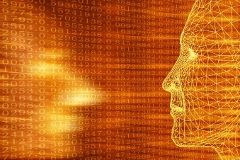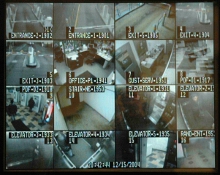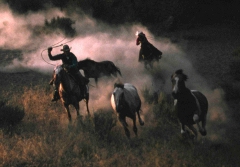A magazine where the digital world meets the real world.
On the web
- Home
- Browse by date
- Browse by topic
- Enter the maze
- Follow our blog
- Follow us on Twitter
- Resources for teachers
- Subscribe
In print
What is cs4fn?
- About us
- Contact us
- Partners
- Privacy and cookies
- Copyright and contributions
- Links to other fun sites
- Complete our questionnaire, give us feedback
Search:
The FUNdamentals of Computers and Society

Technology changes society. Whether fire, wheels, guns or skyscrapers, all have made a massive difference to the way we work, live and play. Computer technology is accelerating the change and raising whole new issues society has to tackle. It stretches the limits of the law - if you steal someone's virtual money in a virtual world are you a thief?It raises new ethical questions - when is it ethical to pose as someone else online? It affects our privacy - would you be happy if your kid brother could check exactly what you were doing on that date by tapping into all those CCTV cameras and webcams, watching your every move from his mobile, wherever you went...whatever you did? What if any body could do it, anytime, anywhere just by typing in your name? All this is technically feasible. Should it be made possible? Who should decide?
Do you care what others know about you?

Shops track your every purchase, search engines record your every query, your mobile phone company can follow your every move and ever present cameras silently watch (remember they even fit into cricket stumps now!) Your every illness is recorded by the medics, your finger prints and iris prints are recorded by companies and governments. Next will be your DNA with all the evidence it holds of you as a person: from where your ancestors came from and who your parents were or weren't, to what illnesses you (or your children) are likely to die of.
Technology now exists to store all of this information and allow it to be linked, allowing anyone who can gain access to it to find anything they wish about you: things perhaps that even you may not know yourself. Who should be allowed to make such connections, who should be allowed to look up your life? Who should decide? You? Your government? The Boss of any corporation big enough to demand it? Spammers? The computer scientists who develop the technology? Perhaps it can only do good, so it doesn't matter who has access or who decides. What do you think?
Here is a video by the American Civil Liberties Union. [External Link] They think it's got to be stopped. Do you agree or are they making a fuss about nothing? Remember to watch it with the sound on... Oh and of course if you agree with them you wouldn't want to join as that would involve your details being added to their database!
No, I don't want a date

Technology changes the way we live our lives in obvious ways but also in much more subtle ways. Predict the subtleties before they are obvious and you could be the person responsible for the next big thing that immediately becomes indispensable. You need a really good understanding of people and how society ticks if you are to do that due to more than just luck though.
A change is gonna come
Can you imagine what it was like not that many years ago when no-one had mobile phones? When music wasn't downloadable? When the Web didn't exist? How did you chat to friends? - You had to be with them at the time! How did you get music? - You had to go to a shop and buy a physical copy! How did you find information? You went to a library, if it was open, and looked through volume after volume of Encyclopedia Britannica!
Can you imagine what it will be like in 10 years time? New technology is arriving ever faster driving old technology to extinction barely before it is out of the box. Some things like paper have so far resisted the predictions of their demise. Other things like LPs vanished quickly. Their successors CDs have lasted hardly any time at all. What do you think will stay and what will go? Have your say in our Disappearing Technology Vote
Harder still can you predict how the technologies that disappear and those that are yet to come will change the way we live, work and play?
The new wild west

In the wild west, justice was delivered at the end of a gun. It was a lawless place where anarchy and brute force ruled ... until the federal government rode in and enforced the law.
Or was it really like that? That may be the Hollywood myth, but some argue that what actually happened was the everyday citizens tamed the west themselves by working together to invent a suitable system of law and then enforce it. Some think the Internet is similar to the Wild west frontier - a lawless place full of viruses and worms, overloaded by scam emails and spam, zombies and spybots: crimes that could never exist before. What is best? Should the governments of the world wade in and enforce their laws (deporting you to the US for trial perhaps) even if you are some where else, or is the virtual world best left to regulate itself?
Take a tour at some of the new kinds of crime... if we don't defeat this new virtual lawlessness the Internet could become useless...unless the computer scientists help the new online communities to devise ways to protect themselves and to enforce justice.
Is that ethical?

Computers raise all sorts of new ethical questions. Is it ethical to hack into other peoples systems if you are doing it to highlight problems that need fixing? Is it ethical to pretend to be a woman online when you aren't. What about pretending to be a child or an adult? How hard do you have to try to get rid of the bugs from software before it is released? What if the code is for running an ambulance dispatch centre? Or a nuclear power plant?
Supporting Cultures not Destroying them

Computer technology can change society for the better or it can destroy the things we value. Some think the Internet will lead to local languages and cultures disappearing. Maybe it can save them from extinction. Others think whole new sub-cultures will emerge. Some people don't think it matters. Others care deeply. Some think it supports democratic freedom and is helping the voices of protesters round the world be heard. Others that it is being used to suppress them. Murderers can use it to show their executions. Charities use it to raise awareness of the plight of Africa. The Web can be used for evil or good. Ultimately, its not the technology that decides. It is not the people who invent the technologies, either. We all do. Society.



